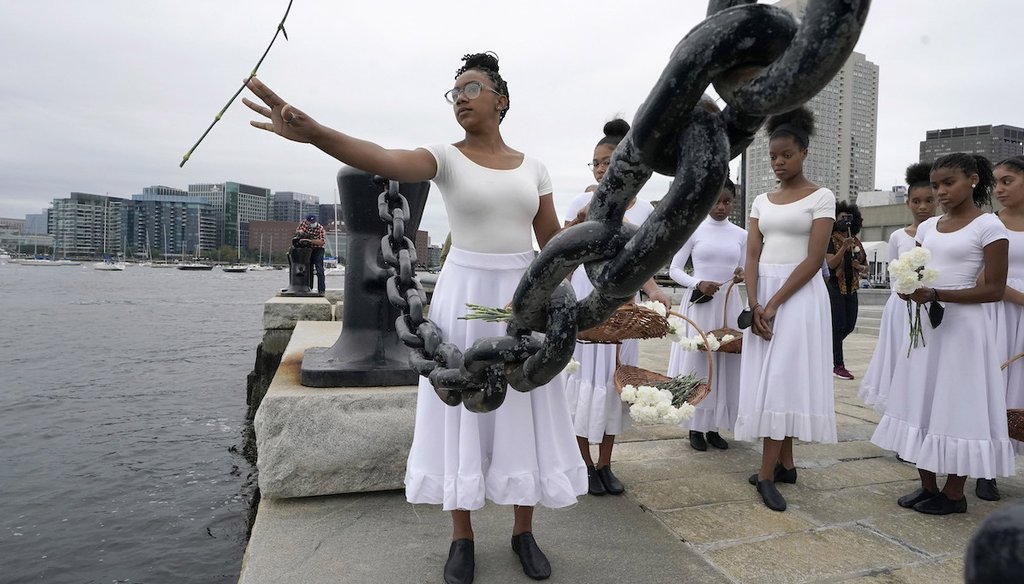

Our only agenda is to publish the truth so you can be an informed participant in democracy.
We need your help.


A dancer throws carnations into Boston Harbor, Sunday, Aug. 29, 2021, in a ceremony honoring Africans who survived or perished during the transatlantic voyage into American slavery. Flowers were thrown in remembrance of their lives and deaths. (AP)
A man in a TikTok video claimed to unveil what he says is a giant historical lie.
Black Americans are not descended from people who were taken from Africa, he said in the video, which he also posted on Facebook Jan. 18. Black Americans were the true Native Americans, he said.
"They just renamed us," he said, "They enslaved us and renamed us. They didn’t bring us across from (expletive) Africa, neither!"
As evidence, the video showed historic pictures of Black and indigenous people.
That video gathered thousands of likes, but was flagged as part of Facebook’s efforts to combat false news and misinformation on its News Feed. (Read more about our partnership with Facebook.)
There are people of both African and Native American descent. But this post ignores hundreds of years of documented history and science that tells the story of how Africans were forced to migrate to the Americas.
Evidence of 400 years of transatlantic slave trade is embedded in history books, letters, ship manifests, diagrams and artwork, speeches, literature, legislation and more. An estimated 10.7 million Africans survived the transatlantic journey to the Americas. A database by historians captures some details of these trips.
Historians believe the first ship to bring enslaved Africans to North America arrived in 1526 under Spanish explorer Lucas Vázquez de Ayllón. In 1619, enslaved Africans from Angola arrived on the coast of Hampton, Virginia, on a ship called the White Lion, becoming the first recorded Africans to arrive in England's mainland American colonies.
As recently as 2019, archaeologists recovered in Alabama the remnants of the Clotilda, believed to be the last known slave ship to bring Africans in bondage to the U.S. It arrived on the banks of Alabama in 1860 — more than 50 years after Congress had outlawed the slave trade starting in 1808.
Some other artifacts give a look into the slave trade: at the National Museum of African American History and Culture in Washington, D.C., a wage book dating back to the 1700s shows detailed records of bought and sold slaves from the Cameroons in West Africa. In Providence, Rhode Island, the John Carter Brown Library has a pamphlet dating back to 1814 that depicts an etching of a slave ship.
Facebook video, Jan. 19, 2023
United Nations, International Day of Remembrance of the Victims of Slavery and the Transatlantic Slave Trade, accessed Jan. 27, 2023
Medford Historical Society and Museum, Slave Trade Letters, accessed Jan. 30, 2023
Princeton University Library, Description of a Slave Ship. London: Printed by James Phillips [for the London Committee of the Society for Effecting the Abolition of the Slave Trade], 1789. Two broadsides, Jan. 30, 2023
Princeton University Press, Committed to Memory: The Art of the Slave Ship Icon, Jan. 30, 2023
National Gallery of Art, Slave Trade, 1791, accessed Jan. 30, 2023
National Archives, American Slavery, Civil Records, accessed Jan. 30, 2023
Time Magazine, The First Africans in Virginia Landed in 1619. It Was a Turning Point for Slavery in American History—But Not the Beginning, Aug. 20, 2019
Hampton History Museum, The 1619 Landing — Virginia's First Africans Report & FAQs accessed Jan. 30, 2023
The New York Times, 1619 Project, accessed Jan. 30, 2023
SlaveVoyages.org, accessed Jan. 30, 2023
The Washington Post, Before 1619, there was 1526: The mystery of the first enslaved Africans in what became the United States, Sept. 7, 2019The Gilder Lehrman Institute of American History, Historical Context: Facts about the Slave Trade and Slavery, accessed Jan. 27, 2023
National Park Service, The Middle Passage Boston African American National Historic Site, accessed Jan. 27, 2023
PolitiFact, Social media claims that slave ships didn't exist are wrong, July 13, 2022
National Archives, African American Heritage, Slave Ship Manifests filed at New Orleans 1807-1860, Slave Manifests of Coastwise Vessels Filed at New Orleans, Louisiana, 1807-1860, accessed Jan. 27, 2023
National Museum of African American History and Culture, Wage book for the slave trading ship Fox captained by Robert Mitchell, accessed Jan. 27, 2023
The John Carter Brown Library, Resources for the Study of Slavery and its Legacy, Jan. 27, 2023
Smithsonian Magazine, New Research Reveals the Transatlantic Slave Trade’s Genetic Legacy, July 28, 2020
The John Carter Brown Library, Diagram of a Slave Ship, accessed Jan. 30, 2023
In a world of wild talk and fake news, help us stand up for the facts.
